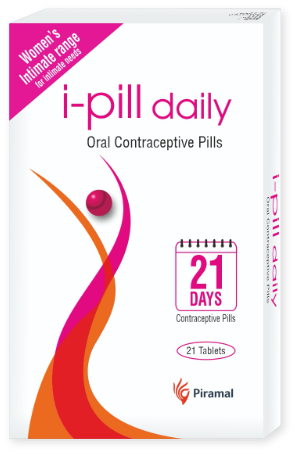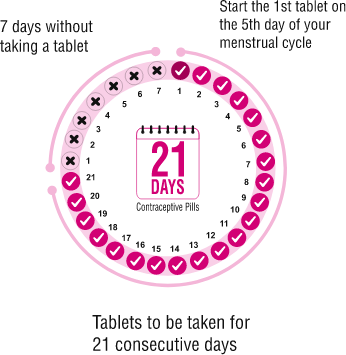They're not ready yet?
It’s okay
Being pregnant is a choice. And we get it. One may not always going to be ready when it happens. Thereby, they should have all the rights to choose.

Being pregnant is a choice. And we get it. One may not always going to be ready when it happens. Thereby, they should have all the rights to choose.
i-pill daily is an oral contraceptive pill. Being a regular contraceptive pill with a low dose of hormones, it needs to be taken every day. It is a simple effective contraceptive pill for women who want to delay their pregnancy or space the next child. i-pill daily is available in packs containing monthly supply. Each strip contains 21 tablets.

An Oral Contraceptive pill works by stopping sperm from joining with an egg (which is called fertilization). The hormones in the pill stop ovulation. No ovulation means there's no egg hanging around for sperm to fertilize, so pregnancy can't happen.
When one takes an i-pill daily on a regular basis, ovulation or the release of egg is suppressed. In the absence of an egg, conception is avoided.
The i-pill daily’s hormones also thicken the mucus on the cervix.
One Tablet daily for 21 consecutive days, starting from the 5th day of one's menstrual cycle. Follow it with 7 days without taking a pill. On 8th day start a new pack. Thereafter continue taking i-pill daily for “3 weeks on and 1 week off” as long as one desires protection.

For the first 2-3 months at least, we recommend that along with i-pill daily one should use a mechanical contraceptive such as condoms as additional birth control measure. During these months, one's body will adjust to the new hormonal treatment and ovulation will be successfully suppressed. Post this one may choose to use i-pill daily as a single form of birth control. However, please remember that no form of contraception provides 100% protection. Also, i-pill daily being an oral contraceptive will not protect one from sexually transmitted diseases.
i-pill daily is designed to protect one from pregnancy but it will do this only as long as one follows the schedule carefully. If one forgets to take pills or if one starts a package late, one's body may not have enough of the substances needed to prevent pregnancy. In such cases, use a supplementary birth control method, such as condoms, until one finishes the package.
If one forgets to take 1 pill, please take the forgotten pill along with the next day' s dose. Similarly, if one forgets to take one pill for 2 days, take both the pills along with the next day' s dose. In both cases continue one's schedule until the package is finished. Remember to use a supplementary contraceptive such as a condom as one would need additional protection. In case one forgets 3 tablets in row do not take any more i-pill daily tablets. Wait for four more days. On the 5th day start a new packet of i-pill daily. Please start a new packet on the 5th day even if one is still bleeding. Remember to use additional birth control or protection such as condoms, till one starts their new i-pill daily packet.
The first step is to keep a watch on one's menstrual cycle so that one can identify the days correctly. One must start the first tablet on the 5th day of one's menstrual cycle. Take one tablet every day for 21 days and make sure one has it at around the same time everyday. Wait for 7 days after one finishes the first pack of the strip. One will get one's periods during that time. Make sure to start the second pack on the 8th day and continue the process like previously. Please note that for the second pack and the packs thereafter, one is not required for one's periods to get over. This is only applicable to the first ever pack one takes.

If vomiting occurs within 4 hours after taking the tablet, absorption may not be complete. One needs to then take the next day' s dose today. If one vomited more than 4 hours after taking one's tablet, one need not take another pill. 4 hours is ample time for one's body to absorb the medicine and provide one with the necessary protection.
If one has been taking i-pill daily every day, as per directions and have not started any other medication at the same time, then chances of pregnancy are low. However, if one accidentally skipped a tablet or have recently started a medical treatment such as certain antibiotics, chances are that i-pill daily was not able to provide one complete protection. In either case, we would advise one to test for pregnancy and visit one's gynaecologist before one starts the next pack of regular contraceptive pills.
For the first few months, one may suffer from changes in appetite, stomach cramps or bloating, tenderness of the breast, headache, nausea, dizziness and spotting. But as one's body gets used to the contraceptive pills these symptoms will disappear. If the symptom does not settle down or get worse, please consult a doctor immediately. These side effects are common, but it' s not necessary that all women face these problems. In some women, the long-term use of the oral pill may lead to increased risk of high blood pressure, heart attack or venous thrombosis.
Before starting i-pill daily one needs to consult one's doctor if:
i-pill daily should not be taken if one is pregnant, are planning to become pregnant, have given birth, are breast-feeding or have just ended a pregnancy in the last 4 weeks. If one is allergic to any of the constituents of this tablet, please do not consume this tablet. i-pill daily is meant to be consumed only by women of menstruating ages. This tablet not meant for consumption by non-menstruating women irrespective of her age or children without a doctor' s supervision.
i-pill daily are hormonal tablets. As these tablets need to be taken regularly, a check-up once every year by a certified gynaecologist is recommended. Additionally, if one faces severe bout of the mentioned side-effect, feel a tightened chest or miss ones periods, we advise one to visit one's doctor immediately.
i-pill daily is an oral contraceptive. This tablet does not protect against transmission of HIV (AIDS) and other sexually transmitted diseases (STDs) such as Chlamydia, genital herpes, genital warts, gonorrhea, hepatitis B, and syphilis. To prevent any sexually transmitted disease we recommend that one uses mechanical contraceptives such as condoms.